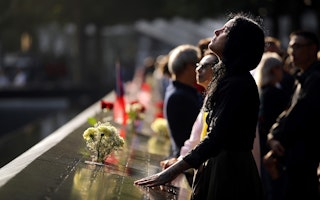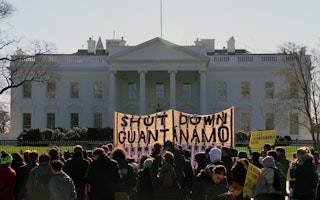From Countering Financial Crime to Criminalizing Civil Society: How the FATF Overstepped the Mark
By Ben Hayes
A powerful yet unaccountable global standard–setting body is helping repressive civil society regulations to spread and flourish across the globe. Ben Hayes lifts the lid on the Financial Action Task Force.
In 2011, Lia van Broekhoven and Fulco von Deventer from the Dutch development organization Cordaid approached me with a problem and a hunch. Like many international grantmakers, Cordaid was concerned about the growing difficulties they faced working in repressive countries and conflict zones, and what appeared to be a glut of new national NGO laws hampering their international operations and the activities of local partners.
New and highly restrictive regulations were being applied to NGOs in countries across the world, including Burma, Cambodia, India, Indonesia, Paraguay and Sierra Leone. Deventer and van Broekhoven had become aware of the Financial Action Task Force (FATF), an opaque, global standard-setting body concerned with combatting money laundering and the financing of terrorism. Could the FATF be the ultimate source of these new rules and regulations?
Further research revealed that a singular and relatively baseless focus by this powerful yet unaccountable organization on the role of non–profits as conduits for terrorist financing was indeed driving the new rules. Moreover, the FATF recommendations on non–profit governance were potentially providing cover for a second group of countries, countries such as Egypt, Tunisia, Saudi Arabia and Russia, as their governments maintained and in some cases tightened their traditionally firm grip on civil society.
The FATF is an international consortium of governments established by the G7 in 1990 to combat money laundering. After the terrorist attacks of 9/11 it radically expanded its activities to promote the adoption of measures codified in the U.S. PATRIOT Act against the material support, intentionally or otherwise, of terrorist groups. The FATF now presides over the development and global implementation of 40 detailed recommendations on combating money laundering and terrorist financing, backed up by a rolling inspection and reporting regime. All but a handful of countries around the world are now committed at ministerial level to putting the recommendations into practice. Yet despite its global policy–making role, there is no intergovernmental convention underpinning or regulating the activities of the FATF.
FATF Recommendation 8 (R8) states that:
Countries should review the adequacy of laws and regulations that relate to entities that can be abused for the financing of terrorism. Non–profit organizations are particularly vulnerable, and countries should ensure that they cannot be misused: (i) by terrorist organizations posing as legitimate entities; (ii) to exploit legitimate entities as conduits for terrorist financing, including for the purpose of escaping asset freezing measures; and (iii) to conceal or obscure the clandestine diversion of funds intended for legitimate purposes to terrorist organizations.
Whereas R8 appears to leave signatory states a reasonable margin of discretion to what appears to be a reasonable request, the supplementary guidance essentially requires them to enact a host of specific measures, including the licensing or registration of nonprofits, increased police scrutiny of the nonprofit sector and strict reporting and vetting requirements. Together, they add up to a recipe for civil society repression. Indeed, the FATF-led evaluation of Saudi Arabia in 2010, which rated the kingdom as “largely compliant” with R8, speaks enthusiastically of a “comprehensive” system of regulation that “outclasses” many others and “appears to be rather effective.” What the evaluators fail to stress is that, in Saudi Arabia, only organizations established by royal decree are permitted.
True, the FATF’s best practice on R8 encourages states to ensure the “legitimate activities” of nonprofits are not hindered. But the incentives are misaligned: there is nothing further in the lengthy guidance on how best to protect freedom of association and expression in the delicate realm of non–profit/civil society regulation. Nor is there any recognition on the part of the FATF that the relatively high standards of transparency, accountability and self-regulation developed by the sector itself might be more appropriate than top-down directives.
Whereas human rights are conspicuous by their absence in the FATF’s work, countries that refuse to adopt the FATF standards or submit to a review are named-and-shamed and, as a last resort, “blacklisted.” And because the FATF standards have become a central feature of the global “good governance” agenda, even making it into the 2011 Busan Declaration on aid effectiveness, good ratings are particularly important.
A controversial Terrorism Financing Bill approved by the Turkish Parliament in February 2013 demonstrates the power of the FATF. Critics had long argued that the draft law would be used to further stifle political opposition in a state that has been strongly criticized by the UN Human Rights Committee, among others, for using counter-terrorism laws against politicians, activists, lawyers, journalists and human rights defenders. Yet at its October 2012 plenary, the FATF issued a formal threat to suspend Turkey’s membership by February 2013 unless the Bill was adopted. Prior to the Parliamentary vote, the Turkish Justice Minister warned legislators that if they failed to back the bill “…the Turkish economy may face serious problems.” His fears appeared to be well-founded: the global credit rating agency Fitch issued a written statement welcoming the subsequent adoption of the law.
Turkey is not an isolated example. In India, NGOs can only receive foreign funding with prior permission from the Home Ministry, in accordance with the Foreign Contributions Regulation Act (FCRA). In 2010, in advance of publication of a critical evaluation of India’s compliance with R8, the Act was amended to allow the government to withdraw the permits of NGOs designated as “organizations of a political nature.” Leaked U.S. diplomatic cables show that U.S. Treasury officials welcomed the amendments in that they reflected “considerable thinking” on countering the finance of terrorism that “would provide an excellent example to other countries in [the] South Asia region.” In August 2012 more than 4,000 Indian NGOs had their FCRA permits suspended at a stroke, including almost 800 in Tamil Nadu, location of massive protests against the Kudankulam nuclear site.
In 2012, the FATF completed its third round of evaluations. As part of our report into the FATF, Counter–terrorism, ‘policy laundering’ and the FATF: Legalizing surveillance, regulating civil society, Statewatch examined these evaluations with respect to R8. We found that 135 of the 159 countries evaluated were rated as “Non-Compliant” or “Partially Compliant” with R8. The very real worry is that more of these countries will now come under pressure to introduce new regulations that threaten civil society.
There is a way forward. Our report inspired an international coalition of foundations, funders and concerned NGOs whose diligent lobbying led to a statement circulated at the FATF plenary in October 2012 by the United States, Canada, France, Italy, Japan, and the UK and endorsed by the World Bank, which expressed concern that R8 “is being used as justification to suppress the activities of legitimate [NGOs] and charitable and civil society organizations” and clarifying that this was never the recommendation’s intention. This has opened the door to a much needed if nascent dialogue between the FATF and the nonprofit sector about possible reforms.
Much remains to be done. When officials put pen to paper on the FATF Recommendations in 2001, they could not have envisaged that the framework they had created would develop a momentum all of its own. Despite the lack of evidence of systematic vulnerability of nonprofits and myriad obvious ways in which terrorists might raise and move monies, no other sector has been singled out as being vulnerable to terrorist financing in the same way as the nonprofit sector. Because foundations and civil society groups fear irreparable damage to their reputations from even the slightest association with “terrorist financing”, few are willing to speak out about the problems they encounter with regulations such as those orchestrated by the FATF. And yet speak out they must, if this nascent dialogue is to have any hope of rolling back the machinery of repression set in motion by the FATF, and defending the political space of civil society groups and other nonprofits.
Parts of this post were adapted from a chapter written for “State of Civil Society 2013,” published by CIVICUS.
Ben Hayes works with Statewatch and TNI and is author of Counter–terrorism, “policy laundering” and the FATF: Legalizing surveillance, regulating civil society.


